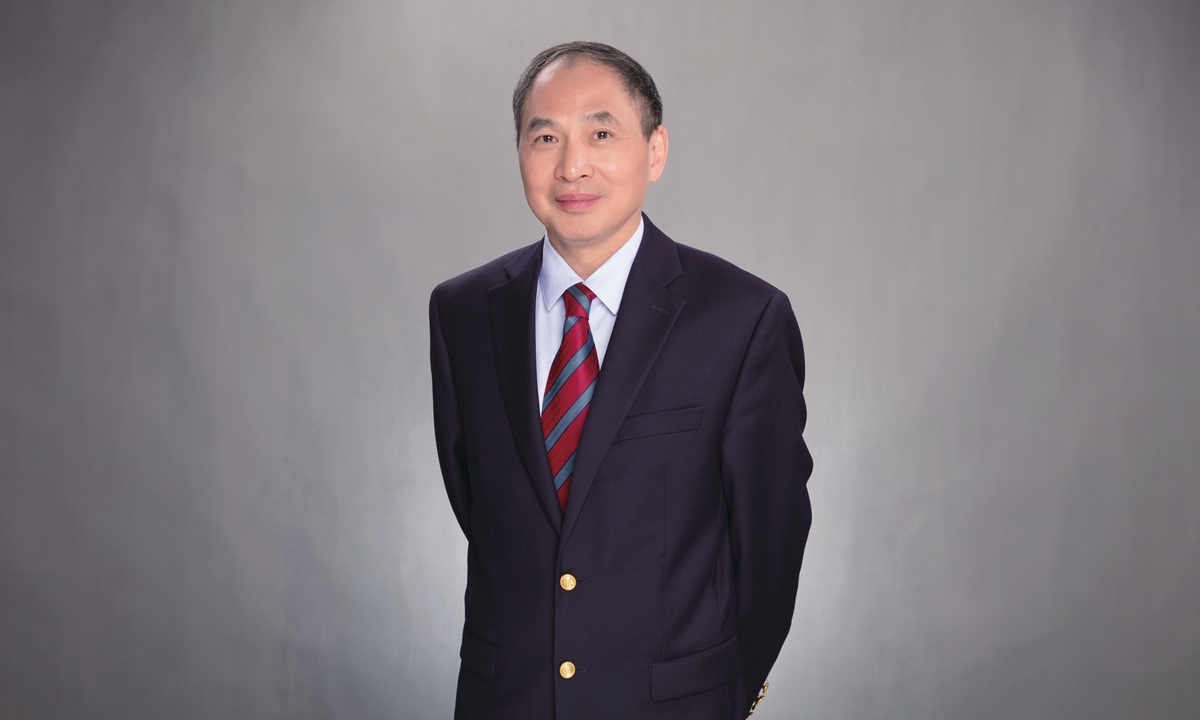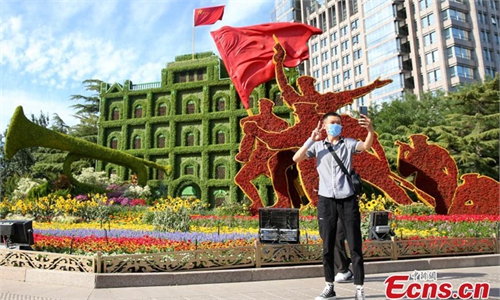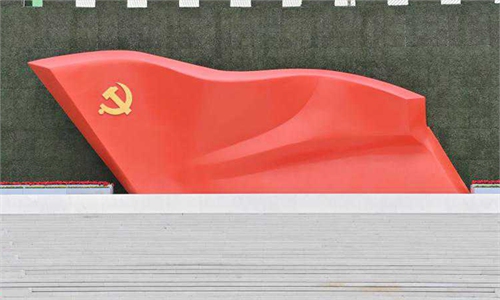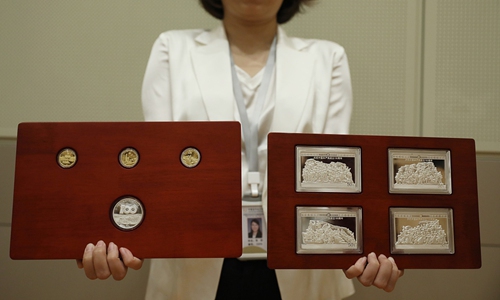
Illustration: Liu Rui/GT
Editor's Note:
Why do some Western politicians and scholars show much more intention to demonize the Communist Party of China (CPC) when they know very little about the largest political party in the world? To understand China today, one must first know more about the CPC. As the Chinese people are about to celebrate the 100th anniversary of the founding of the CPC, the Global Times reporter Bai Yunyi interviewed the country's top political scientist Zheng Yongnian, presidential chair professor, acting dean of the School of Humanities and Social Science and the Founding Director of the Advanced Institute of Global and Contemporary China Studies, the Chinese University of Hong Kong, Shenzhen. He talked about how to see the legitimacy of the CPC and how it reached reforms goals through non-Western ways.
GT: In recent years, the Western politicians and academicians have made more misjudgments against the Communist Party of China, trying to demonize it. This has become a much serious phenomenon. What do you think is the root cause of this?
Zheng: The misunderstanding and misjudgment of the CPC in the West is largely due to the lack of research about the CPC in the West, especially in recent years. Historically before 1949, people like American journalist Edgar Snow and others in the West were very interested in the CPC. They even made a special trip to Yan'an to file in-depth reports about the Party. From 1949 to the 1970s, even when China did not really communicate much with the West, there were still many Western scholars studying all aspects of the CPC - with numerous books coming out. They understood the importance of studying the Party. However, there were fewer and fewer books since the 1980s. Why? Because Western scholars thought that the CPC was no longer important. They also thought that the Party was outdated, so research was not necessary.
This trend was also related to the political and social changes in the West at that time. Before the 1980s, the political system adopted by the West was essentially an elite democracy, and political parties were the main body of this elite democracy. However, after the 1970s, popular democracy of one person, one vote gradually emerged in the US and other Western countries. This had a great impact on Western party systems.
Since then until today, Western parties have been in a state of decline, and neoliberalism is rising day by day. This means that the status of capital has become more important, and politics has been marginalized. This is also the case in countries such as the UK and the US, which are generally the root causes of governance crises there.
In this context, the overall research direction of Western scholars has gradually shifted from political parties to social organizations, to the so-called "post-industrial era" issues, and this trend has also affected their research on the CPC. A closer look at the Western monographs on China in recent years, it is not difficult to find that there are many articles on China's environmental movement, farmers protests, and non-governmental organizations, but very few studies on the Party. However, is the role played by the CPC in China more important, or is the role played by NGOs more important? The answer is obvious.
Many of the wrong policies toward China in the West stem from their misunderstanding of the CPC: Failure to study leads to ignorance, and ignorance further misleads policy making. Some so-called Chinese experts and opinion leaders in the West have even conveyed wrong judgments from an ideological point of view; such as the collapse of the Party and the separation of the CPC from the Chinese people. But the facts are completely contrary to their judgments. If the US does not correct these misjudgments, it will continue to make big mistakes with its China policy.

Zheng Yongnian Photo: Courtesy of Zheng
GT: "Legitimacy" is one of the most frequently criticized issues of the CPC, according to some Western scholars. They believe that there is no one-person-one-vote universal suffrage in China, so the CPC is not broadly representative. From this they think the CPC's governance of China has no legitimacy. What do you think of this statement? Does the legitimacy of a ruling party have to come from universal suffrage?Zheng: The view - the legitimacy of the ruling party comes from the one-person-one-vote election - is the opinion of Western scholars, not the universal truth. It cannot be used to measure everything.
Also, the universal suffrage issue is not always the case even in the West. If you read the modern and contemporary history of the West, you will find that their views on the legitimacy of those in power are constantly changing. For example, before the emergence of early political parties, the UK used the "old boys' club" to discuss who would be elected to govern. Until World War II, there were very few people in the West who had the right to vote. For example, in the UK, it was mainly the men who had the right to vote and who had paid a lot of taxes to the country. Women did not have the right to vote, and even minorities did not.
In Samuel P. Huntington's book The Third Wave, Sweden was regarded as a model for the realization of democracy in the first wave. But Swedish women did not have the right to vote until 1971. Meanwhile, the US has long considered itself a democratic system, but its "one person, one vote" also started after the civil rights movement in the 1960s and 1970s. Therefore, the legitimacy of the ruling party can only come from one-person, one-vote elections is completely a false proposition.
As result, we do not need to judge ourselves according to the Western definition of legitimacy. The question we really want to ask is: Where does the legitimacy of the CPC come from? I think the legitimacy of the CPC mainly comes from three points. The first point is: The CPC has achieved China's sustainable economic development. Everyone has seen this very clearly.
The second point is: The CPC has achieved sustainable social stability. This social stability was not achieved through dictatorship or a "police state" as the West says. This was not easy to do. From a global perspective, economic development and social stability are a pair of contradictions. The French writer Tocqueville put forward such a problem in his book The Old Regime and the Revolution, stating that there will be poverty if there is no development. But if the development process is not advanced well, then society will also be unstable.
The French Revolution is a case in point. Therefore, sustainable economic development and sustainable social stability have challenges if done at the same time. It is only China that has achieved both goals in the world's major economies. Third, the CPC has realized the support and guidance of a sustainable political system. This is an important institutional source for China to achieve sustainable economic development and social stability at the same time.
GT: What do you mean by, "sustainable political system?" In one of your speeches, you mentioned that many Western scholars believe that China's reform and opening-up was only about economic reform, not about politics. In your opinion, you said China has carried out non-Western political reform. What exactly do you mean by that phrase?
Zheng: The definition of political reform is simple in the West. It includes power rotation among multiple political parties. It means the principle of "one person, one vote," with a separation of powers into three branches, and so on. Measured by this definition, China certainly does not have political reform. But China does have political reform that is not defined by Western standards. And it is one of the roots of China's success today
From a historical and global perspective, several developing countries became independent from the colonial rule of Western powers after the WWII. But many of these countries have not seen a change in their political systems. Even though many elites in these nations seek political independence, they were still educated in the West. Therefore, Western systems are retained in many developing countries, such as those in Latin America, Africa, and even Asia.
On the surface, these states have a multi-party system, the "one person, one vote" principle, and a free press. Still, their "democracy" exists only in name. As a result, they cannot develop their economy or unite the country. For example, in India, the political party Indian National Congress is basically a family organization represented by the Nehru and Gandhi families. Meanwhile, even though Bharatiya Janata Party, the one Indian Prime Minister Narendra Modi belongs to, has developed to be a national party, India still does not have a structural organization as strong as the CPC. Thus, there are always problems in India.
Some Asian countries, on the other hand, have successfully decolonized and de-Westernized their institutions to create a system that fits their civilization and culture. China, Japan and Singapore have also made the most successful institutional reforms. However, these countries are not considered by the West to be true democracies because they have not enacted "power rotation" among multiple political parties. Many Western scholars even consider Japan to be an Eastern country disguised as a Western one.
In general, there are very few countries that meet the Western definition of "democracy," and at the same time achieve development success. According to the World Bank, among more than 100 countries in the world, there are only about 20 that have not fallen into the "middle-income trap" after the WWII, including some small countries in Northern Europe and the Middle East. In Asia, they are mainly the "Four Asian Tigers," encompassing South Korea, Singapore, China's Hong Kong, and the island of Taiwan. The best development period for Taiwan was under the administration of Chiang Ching-kuo. But now, Taiwan's development has come to a standstill after its Westernization. Therefore, we should not forget what Karl Marx said, the economy is the base, while the political system is the superstructure.
My summary of China's political reforms is very simple: The CPC has modernized itself in the country's modernization process of politics, society, and economics. Since the 1980s in China there have been some reforms at the economic and social level. There have also been some at the institutional level; but we did not explicitly call them political reforms. Plus, the West does not understand them with their own theories.
As I always say, if a doctor fails to treat a patient with what he or she has learned, we cannot say that the patient has the wrong disease. We can only say that the doctor's knowledge and experience are not enough. When the West cannot use its theories to explain China's development, Western countries should not simplistically assume that China has done something wrong. They should consider whether their own perception of China is wrong.
GT: You once described China's system as an "open one-party system." What is the fundamental difference between an "open one-party system" and a "one-party autocracy?" Why is China the former and not the latter?
Zheng: I call the Western party systems an "external pluralism." In the US, for example, you can support either the Republican Party or the Democratic Party. And if you don't like either party, theoretically, you can form your own. It means that a country can have several political processes at the same time.
In this "external pluralism," political parties represent the interests of a part of the population, and their survival and development depend on their external openness. Political identity plays an important role in elections because it is an essential tool for different parties to gain political support. Therefore, political parties in Western societies are often established based on rank, class, region, ethnicity, religion, and race.
In contrast to the West, China is "internally pluralistic," as the CPC is the only long-term ruling party and there is only one political process in the country. However, this process is open. In other words, any elite, social group, or representative of economic interests can participate in the process. They can have their interests expressed through internal consultation. It is not a "one-party autocracy" as said in the West. It is, "pluralism in one body."
Take the personnel system as an example. Mao Zedong once said, "We all come from five lakes and four seas" (meaning from all corners of the country). From here, we can see the plurality of representatives. But there is no "mountain" in China to divide these people because they "have joined together for a common revolutionary objective." The expressions of China's other interests are similar as well. As China's society and economy develop, its social interests are bound to be pluralistic. And each interest can be absorbed into the political process under the leadership of the CPC. It means that the problem-solving process is internal, not external.
Historically, hundreds of registered political parties emerged in China after the founding of the Republic of China in 1911. There were even more that were not registered. According to the concept of democracy defined by the West, of course, the more political parties there are, the more democratic it is. But the fact is: the state was simply not functioning. It barely had any efficiency. When a multi-party system is not acceptable to society, the system is doomed to fail.
The political arrangement of "internal pluralism" is also an outward expression of China's historical and cultural characteristics. The Great Unity is an important feature of traditional Chinese culture. In the West, independent states emerged after the disintegration of empires. In Chinese history, despite being divided and unified again and again, "division" is not the ultimate goal. Indeed, "unification" is. But The Great Unity does not mean a unification of interests. Instead, it can develop through "internal pluralism."



